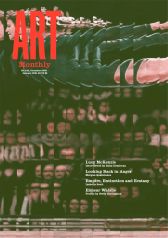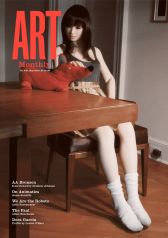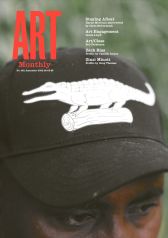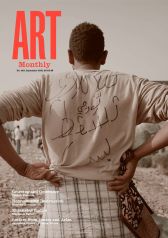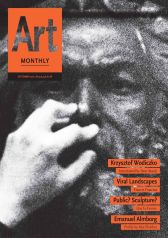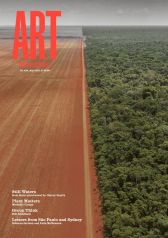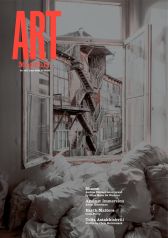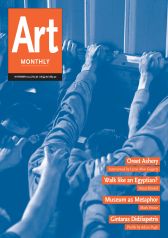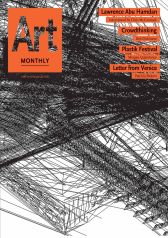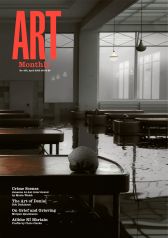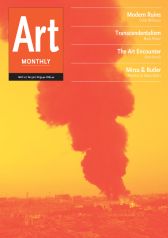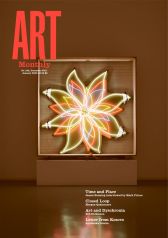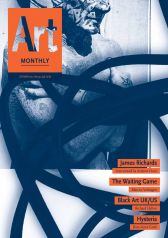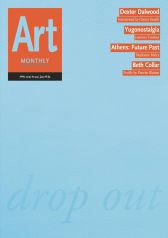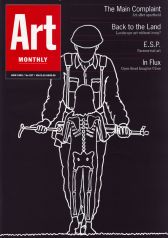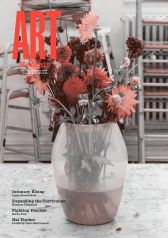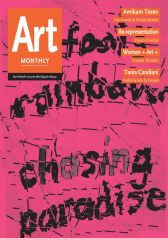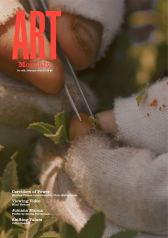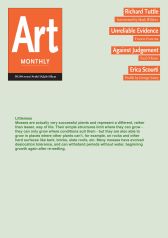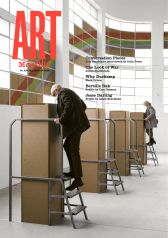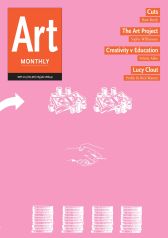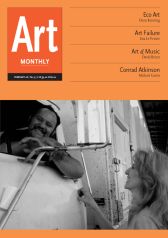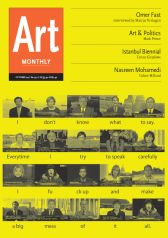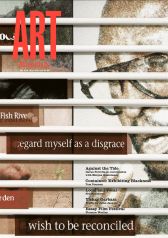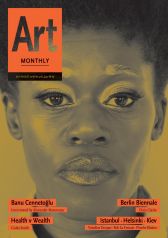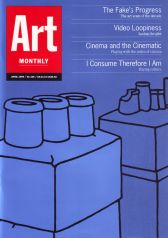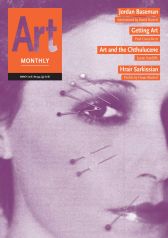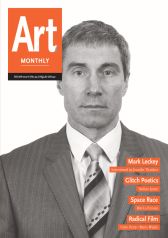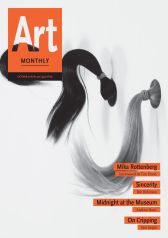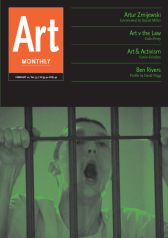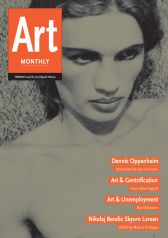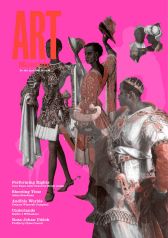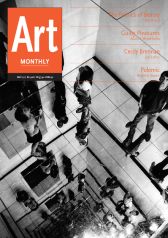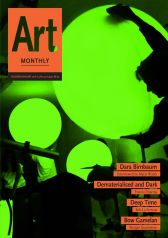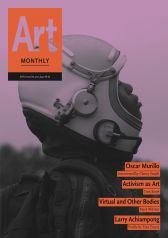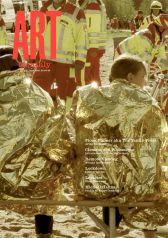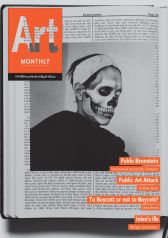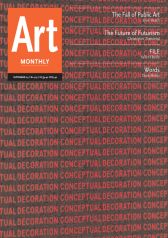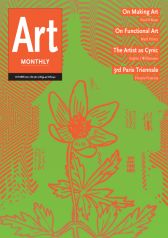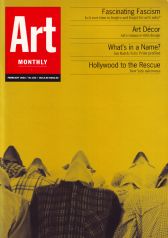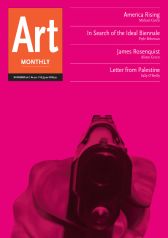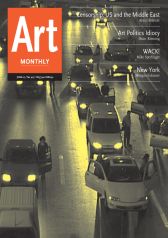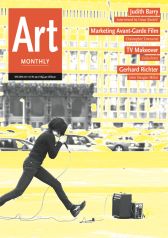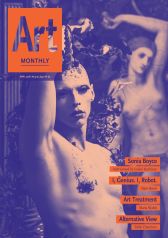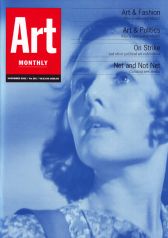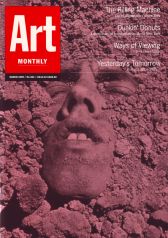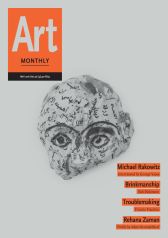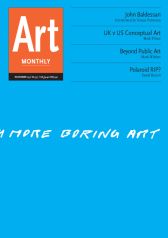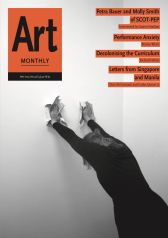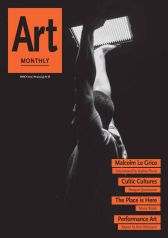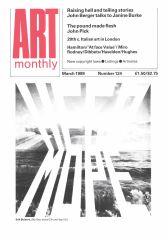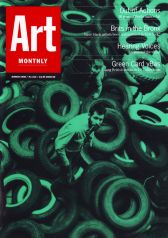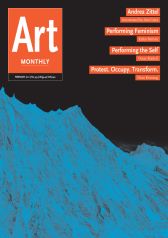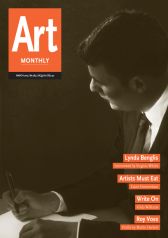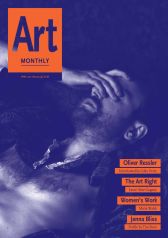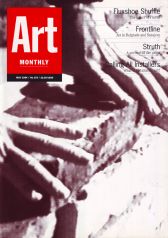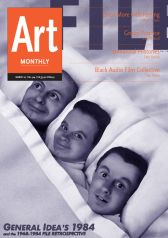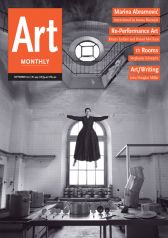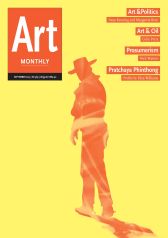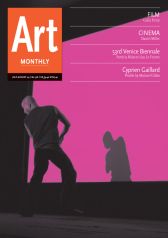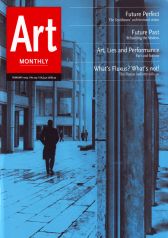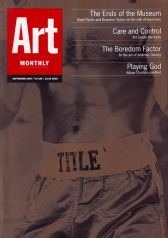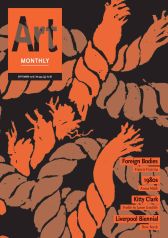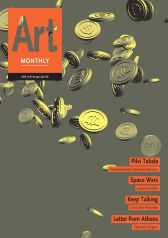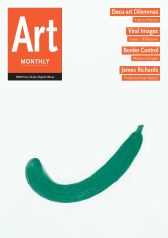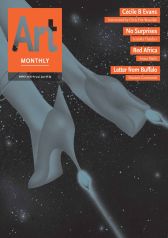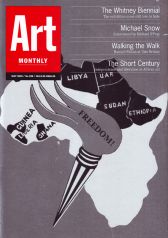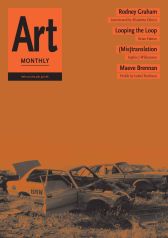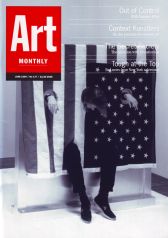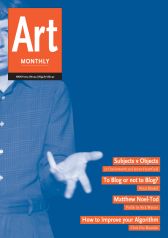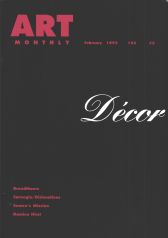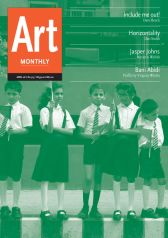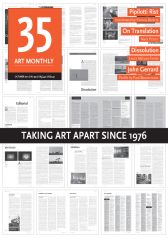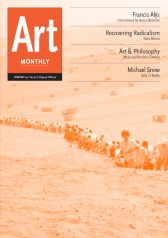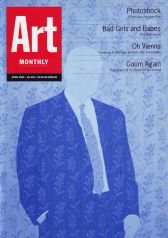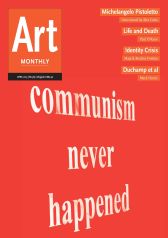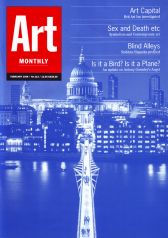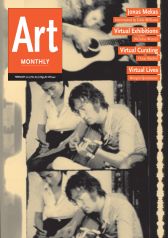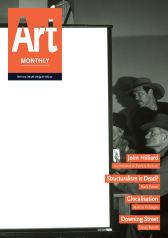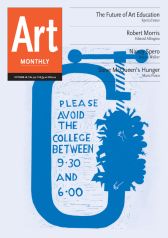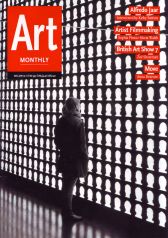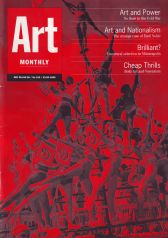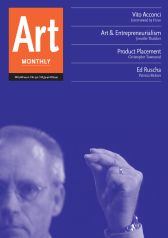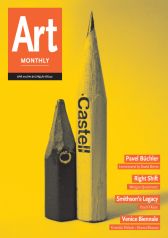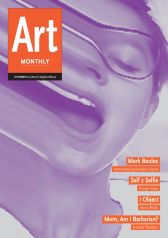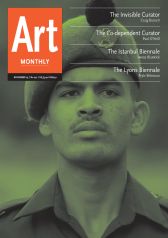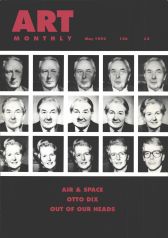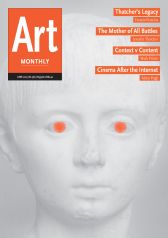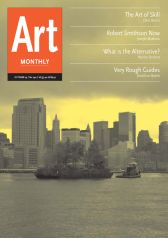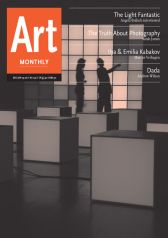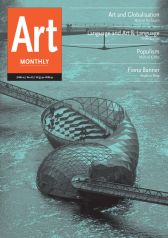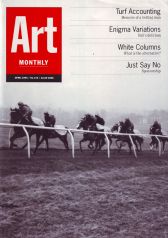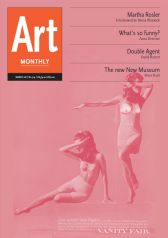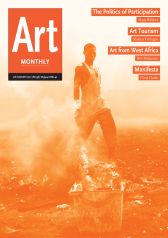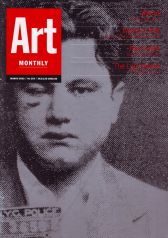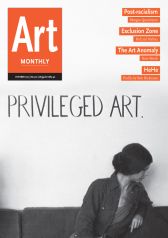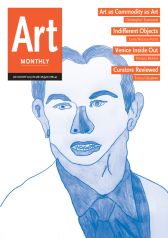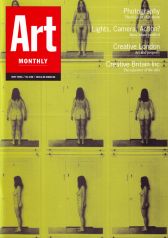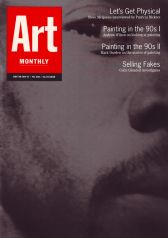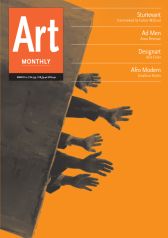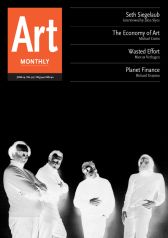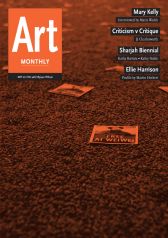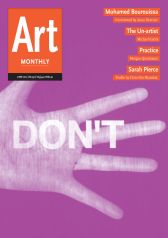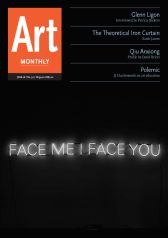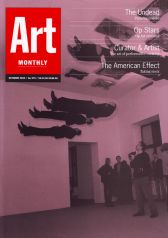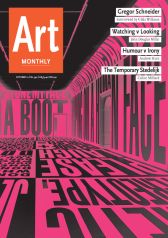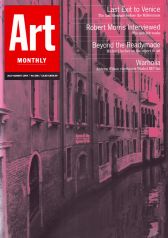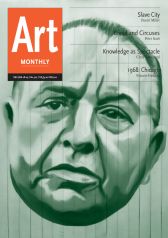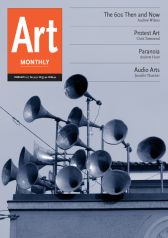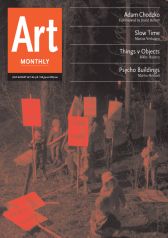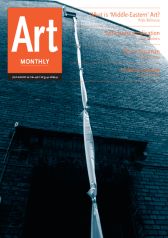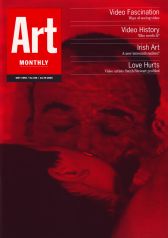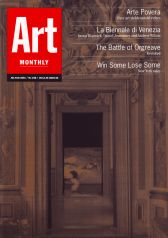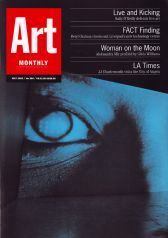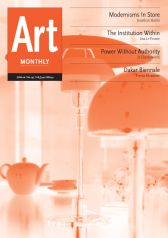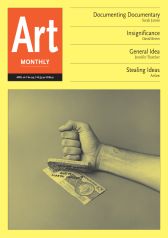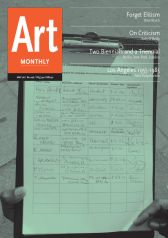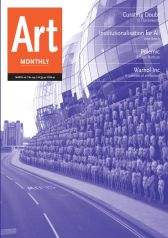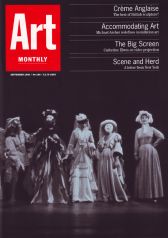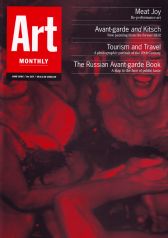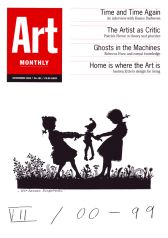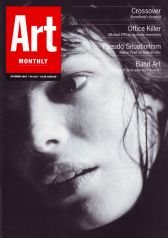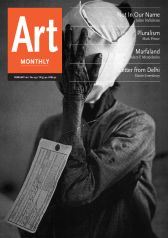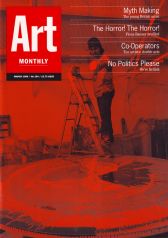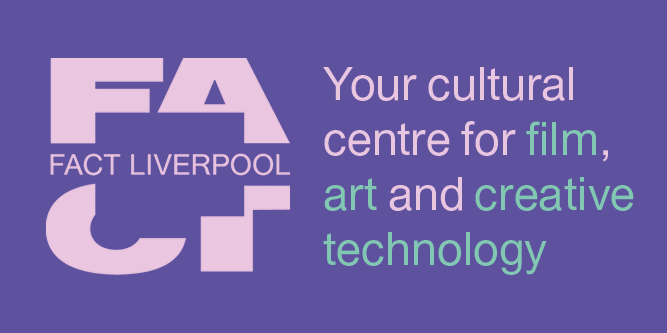From the Back Catalogue
Empire, Extinction and Ecstasy
Izabella Scott claims the US is obsessed yet in denial about the concept of empire
The New Curation
Mark Hutchinson argues that new approaches to curating aestheticise politics
Photography as Work
Stephanie Schwartz questions the utopian potential of digital photography
We Are the Robots
Aoife Rosenmeyer asks how should we coexist with robots and intelligent machines
Art Engagement
Lizzie Lloyd asks whether an artist needs to describe themselves as socially engaged in order to engage socially
Representing Destruction
Matthew Bowman considers the role of archives in recording and representing the destruction of art by artists and by others
Art/Class
Bob Dickinson wonders whether working-class culture can survive in the UK
Public? Sculpture?
Public sculpture is everywhere yet it is in crisis argues Lisa Le Feuvre
Plant Matters
Michaële Cutaya on the politics of plants
Against Immersion
Adam Heardman looks beyond the spectacle of high-tech immersive art experiences
Irreplaceable
Oreet Ashery interviewed by Larne Abse Gogarty
The Listener
Lawrence Abu Hamdan interviewed by Chris McCormack
The Art of Denial
Bob Dickinson on artists who have engaged with the legacies of trauma
It Was What It Was: Modern Ruins
Gilda Williams on the politics and aesthetics of ruins
Art and Dyschronia
Bob Dickinson on art that challenges populist governments’ rewriting of the past
The Waiting Game
Marcus Verhagen on the politics and aesthetics of time
Yugonostalgia
Jasmina Tumbas on the pull of nostalgia as both a poison and a cure
The Main Complaint
Psychosexual fixations and neuroses do not respect national or racial boundaries says Eddie Chambers
Fighting Fascism
Sarah Jury argues that art can make a difference
Mother and Child Divided
Jennifer Thatcher on women in the arts
Steve McQueen: Grenfell
Elisabetta Fabrizi experiences film installation as an act of remembrance
Jumana Manna
Emilia Terracciano profiles the Palestinian artist and filmmaker
Unreliable Evidence
Francis Frascina on countering histories
The Look of War
Julian Stallabrass examines political and corporate interests in relation to images of war
Public Art, Private Amenities
Sara Selwood assesses the state of public art whilst some of it sinks into the Mersey
Expresso Punko
Following the orgy of 1960s nostalgia, Andrew Wilson reviews the inevitable revival of interest in 1970s Punk signalled by a clutch of new books on the subject
Cuts
Dave Beech on the neoliberal agenda behind the cuts in arts education
Eco Art
Dean Kenning on art energy in an age of ecology
Radical Nature: Art & Architecture for a Changing Planet 1969-2009
Colin Perry questions the radical intentions of the Barbican exhibition
Contained: Exhibiting Blackness
Tom Denman argues that Tate used its Lynette Yiadom-Boakye exhibition to suggest that race is no longer an issue
Health v Wealth
In the face of increasing privatisation in the UK Giulia Smith discusses the politics of health
Video After Diderot
According to Dave Beech video projection will be a defining embarrassment for the 1990s like shoulder pads were for the 1980s
Art and the Chthulucene
Jamie Sutcliffe takes a worm’s eye view
Glitch Poetics
Nathan Jones makes new sense from non-sense
On Cripping
Sara Jaspan reports from an artist-led Crip Theory workshop
Encountering Art
Dave Beech critiques Jacques Rancière’s concept of the ‘emancipated spectator’
Art & Activism
Gavin Grindon reports on the crisis in Copenhagen
Art & Gentrification
Larne Abse Gogarty on the uses and abuses of social practice
Letter from Belarus
Uladzimir Hramovich on being swept up in mass political arrests
Underlands
Sophie J Williamson explores how artists are critically reconnecting to our ‘geological ancestry’
Inverted Racism?
Rasheed Araeen delivers a polemic on the cultural policies of positive discrimination
Deep Time
Rob La Frenais on art that might outlive the human race
Activism as Art
Activism is not an add-on says Tom Snow
Remote Viewing
Morgan Quaintance argues that it is time to rethink how artwork is distributed online
Jared Pappas-Kelley: Solvent Form – Art and Destruction
Michael Hampton explores Jared Pappas-Kelley’s idea that art is revealed through its destruction
Art v the Law
Colin Perry discusses protest art that uses the law as an artistic medium
Expanding the Curriculum
Ranjana Thapalyal calls for interdisciplinary art teaching to decolonise the curriculum
To Boycott or Not to Boycott?
Dave Beech asks the question
Inside Out
Dave Beech on the fall of public art
Eddie Chambers: Things Done Change
Richard Hylton on Eddie Chambers’s challenge to art institutions and their treatment of black British artists
Fascinating Fascism?
Barbara Pollack finds she is still not ready to forgive and forget for art’s sake
America Rising
So much expected so little delivered – Michael Corris on post 9/11 art from the USA
Black Art UK/US
Richard Hylton discusses the rise in thematic shows of black artists
Wall of Silence
Anna Dezeuze on art and the climate of censorship that bedevils relations between the US, Israel and the Palestinians
TV Makeover
Colin Perry on the vexed relationship between art and TV
An Alternative History of Art
Eddie Chambers argues that this BBC Radio 4 series continues the UK’s marginalisation of major 20th-century African-American artists
Net and Not Net
Beryl Graham & Sarah Cook explore the debates around curating new media art
FILE
Sally O’Reilly flicks through every issue of General Idea’s FILE magazine from 1972 to 1989
The Killing Machine
Barbara Pollack traces the legacies of David Wojnarowicz in New York today
Troublemaking
Francis Frascina reconsiders conflicting debates about female pleasure and female violation in cultural representation
Me, Myself and Others
Sonia Boyce interviewed by Isobel Harbison
Seeing the World Askance
John Baldessari interviewed by Simon Patterson
Decolonising the Curriculum
Art history lags behind other disciplines in incorporating art by black and ethnic minorities argues Richard Hylton
Art Education and Mental Health – Mark Fisher Remembered
Ashiya Eastwood on the art-education system’s failure to deal with mental-health issues
Raising Hell and Telling Stories
John Berger talks to Janine Burke
Out of Actions
Robert Ayers looks back at three decades of Performance Art
A-Z
Andrea Zittel interviewed by Alex Coles
Artists Must Eat
But at what price asks Lizzie Homersham
The Art Right
Larne Abse Gogarty charts the rise of the right in art
Frontline
Caroline Juler reports on art under fire from Belgrade and Sarajevo
Group Practice
Paul O’Neill on the collective alternative to the romantic cliché of the lone artist, curator and critic
The Artist is Present
Marina Abramovic interviewed by Iwona Blazwick
Art & Oil
Colin Perry on the greasing of the art industry
The Contract
Seth Siegelaub interviewed by John Slyce Part 2
Art, Lies and Performance
Anna Dezeuze reports on what is still a surprisingly little-known art form
The Ends of the Museum
Brandon Taylor muses on the museum of the future
Foreign Bodies
Francis Frascina on Brexit, the body and the workings of the state
Space Wars
Jamie Sutcliffe argues that virtual technologies offer only a fantasy of freedom
Border Control
Marcus Verhagen on the contradictions inherent in globalisation
No Surprises
It is time that the art world put its own house in order, argues Jennifer Thatcher
The Short Century
Barbara Pollack finds at PS1/MoMA a new model of exhibition that reveals Africa’s influence on western modernism
Looping the Loop
Brian Hatton proposes a theory of the loop that predates its popular usage in film and video art theory
Context Kunstlers
Liam Gillick worries about the art of context
How to Improve your Algorithm
Chris Fite-Wassilak on reclaiming the digital landscape
Brits in the Bronx
Has black art from Britain been quarantined in New York asks Eddie Chambers
Public Art Attack
Andrew Hunt on the importance of antagonism in public art
Figure-clé: Broodthaers*
Mark Thomson on the Belgian poet-turned-artist
Include me out!
Dave Beech on participation in art
On Translation
Mark Prince analyses the language of objects
1980s
Amna Malik on viewing the past through the eyes of the present
Recovering Radicalism
Dave Beech on critical art after Postmodernism
Babe Power
Bad girls or babes – Barbara Pollack on postfeminist art
Life and Death
Paul O’Kane on art and being
Art Capital
Simon Ford and Anthony Davies explain the surge to merge culture with the economy
Moon Child
Mark Leckey interviewed by Jennifer Thatcher
Being-Online
Morgan Quaintance on the phenomenon of virtual lives
Cover Stories
John Hilliard interviewed by Patricia Bickers
Education: a mirror or a lamp?
Gareth Jones on the future of art education
Art and the Anthropocene
Bob Dickinson on eco art
Models of Thinking
Alfredo Jaar interviewed by Kathy Battista
Art and Power
Julian Stallabrass finds that the Cold War still dictates the agenda in the Hayward Gallery’s Council of Europe exhibition
Product Placement
Christopher Townsend on the link between Modernism and postmodernity in design
Talkin’ ’bout their g-g-g-generation
Richard Grayson on the ends of post-internet art
Right Shift
Morgan Quaintance on the end of post-internet art
I Object
Maria Walsh on art and the new objecthood
The Co-dependent Curator
Paul O’Neill on the dysfunctional relationship between independent curators and institutions
Art au Lait!
Stuart Morgan traces the brief history of Milch, the Gallery that planned to reach the parts that other galleries don’t reach
50/50
Women are still woefully under-represented in the art world argues Jennifer Thatcher
Robert Smithson Now
For all its environmental, theoretical and literary significance Smithson’s work was above all visual insists Joseph Masheck
The Truth About Photography
Sarah James argues that it is time to re-examine some fundamental issues
Changing States
Eddie Chambers reviews the first decade of inIVA’s activities
Just Say No
James Odling-Smee on a proposal to ban corporate sponsorship of the arts
What’s so funny?
Anna Dezeuze on humour and contemporary art
Gaza
Francis Frascina revisits Lament of the Images
Beyond Public Art
Mark Wilsher proposes redefining public art
Emily Roysdon: I am a Helicopter, Camera, Queen
Maria Walsh logs on to a live-streamed web-based performance
Warhol: Working-class Hero?
What if Warhol Cared? asks David Hopkins
Disrupting Art Education
David Barrett on the future of the art education market
France on Germany
David Lillington on the row over a French show of German art
Art/Writing
John Douglas Millar on why experimental writing thrives in the art world
Indifferent Objects
In our obsession with objects what has happened to the subject asks Laura McLean-Ferris
Wanted: Studio Space
Andrew Wilson asks if artists need to become property developers to keep their studios
Docu-art Dilemmas
Francis Frascina on schisms, ‘splitting’ and contradictions in documentary art
Let’s Get Physical
Steve McQueen interviewed by Patricia Bickers
#Occupy Art
Maja and Reuben Fowkes on the Occupy effect on contemporary art
Ad Men
Anna Dezeuze on the appropriation of art by advertising
The Playmaker
Seth Siegelaub interviewed by John Slyce
Corpus
Mary Kelly interviewed by Maria Walsh
The Un-artist
What do artists need to know? asks Michael Corris
Behind a Theoretical Iron Curtain
According to Sarah James the West’s view of the art of the former Eastern bloc is still too Moscow-centred
Curator and Artist
Alex Farquharson on the new alliance between the performative curator and the relational artist in the postproduction of art
Watching v Looking
John Douglas Millar on the ethics and aesthetics of docu-art
The Object of Art
Michael Archer looks beyond the readymade in art
Art and Theatre
Julian Maynard Smith on Tate Modern’s ‘The World as a Stage’
Bread and Circuses
Peter Scott on the mayor, the waterfalls and the art of neoliberalism
Protest Art
Chris Townsend asks if protest art can be effective
Things v Objects
Rikke Hansen on the public life of things
The Vision Thing
Andrew Wilson finds that ‘About Vision’ is more about looking
Loaded
Mark Durden discusses the matter of painting
Guilty Pleasures
One way to negotiate the ethical uncertainties of images is to consider how they serve our understanding of the subject, suggests Adam E Mendelsohn
Here There and Elsewhere
Recent exhibitions of ‘Middle Eastern’ art rely on very old generalisations argues Pryle Behrman
Videoscan
Video history – who needs it? We do argues Catherine Elwes
Protest. Occupy. Transform.
Dean Kenning reports from the inside on the wave of art school protests
Arte Ricca
Alex Coles discovers untold riches in Arte Povera
Curating New Media
Beryl Graham & Sarah Cook on the challenges of exhibiting massless media
Live and Kicking
Extremist, self-indulgent and uncool it may be but live art also offers new possibilities for politically engaged art argues Sally O’Reilly
Modernisms in Store
According to Andy Warhol all department stores will become museums and all museums will become department stores – Jonathan Harris goes shopping
Documenting Documentary
As documentary retreats from the public to the private sphere Sarah James asks why
On Criticism
A matter of opinion or what? Sally O'Reilly provides some statistics
Institutionalisation for All
Dave Beech tackles an old taboo
Créme Anglaise
Patricia Bickers samples ‘Un siècle de sculpture anglaise’ at the Jeu de Paume
Meat Joy
All good clean fun asks Anna Dezeuze
Home is where the Art is
Andrea Zittel profiled by Benjamin Weil
Movie Wannabes
So you wanna make movies? Michael O’Pray looks at artists as film directors
Slow Time
Marcus Verhagen discusses globalisation and time
Not in Our Name
Julian Stallabrass looks at Iraq through the lens of Vietnam
Art Décor
Alex Coles on art’s romance with design
On refusing to pretend to do politics in a museum
John Jordan on what happened when Tate programmed a workshop on disobedience
Close Up
Fiona Banner profiled by David Barrett

